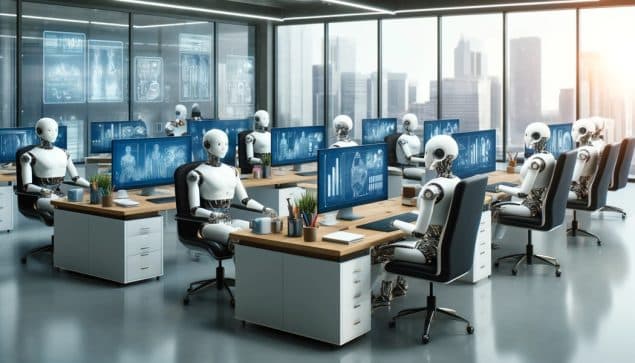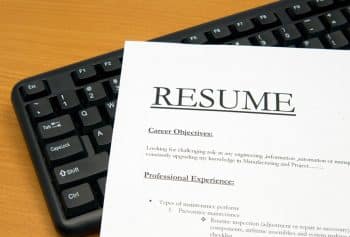Home » Employment News • UK Business News • UK Employment news » AI Could Replace 8 Million UK Jobs, Study Reveals
AI Could Replace 8 Million UK Jobs, Study Reveals
https://www.whatjobs.com/news/united-kingdom/uk-employment-news/ai-could-replace-8-million-uk-jobs-study-reveals

By Kris Paterson in Employment News, posted March 28, 2024

A study has found artificial intelligence (AI) has the potential to displace nearly eight million positions in the UK.
The data from the Institute of Public Policy Research shows women and people in the early stages of their careers face the highest risk.
However, the think tank says strategic government intervention could prevent these job losses.
It also says the government could use AI to significantly boost the UK's economy.
The study looks at the transformative impact generative AI could have on knowledge work.
It highlights the urgency of preparing for these changes.
It is based on an analysis of 22,000 workplace tasks across the UK and reveals 11 percent are vulnerable to automation.
The most at-risk jobs include those that are entry-level, part-time, and administrative.
Many of these roles are occupied by women.
The report predicts an initial phase of AI adoption targets these "low-hanging fruit" jobs.
This could lead to the elimination of one-third of administrative positions.
A subsequent, more intense phase of AI integration could endanger up to 59 percent of tasks.
This poses a threat to a broader range of employment.
This even might affect higher-paying jobs, if AI is given access to proprietary information and essential tasks.
While the study presents various outcomes, it acknowledges the potential for avoiding job displacement altogether.
Worst Case Scenario: "Full displacement: all jobs at risk are replaced by AI, with 7.9 million job losses and no GDP gains"
The report's "Best Case Scenario" is "full augmentation: all jobs at risk are augmented to adapt to AI, instead of replaced, leading to no job losses and an economic boost of 13 per cent to GDP (£306bn per year)"
It has also predicted a "Central Scenario" in which "4.4 million jobs disappear, but with economic gains of 6.3 per cent of GDP (£144bn per year)."
The "Worst Case Scenario" is: "Full displacement: all jobs at risk are replaced by AI, with 7.9 million job losses and no GDP gains"
Carsten Jung, senior economist at IPPR, said:
"Already existing generative AI could lead to big labour market disruption or it could hugely boost economic growth, either way it is set to be a game changer for millions of us.
"Many firms are already investing in it, and it has potential to speed up many more tasks as more businesses adopt it.
“Over the next five years it could transform knowledge work.
The question now is less whether AI can be useful, but rather how fast and in what manner employers will use it.
History show that technological transition can be a boon if well managed, or can end in disruption if left to unfold without controls. Indeed, some occupations could be hard hit by generative AI, starting with back office jobs.
“But technology isn’t destiny and a jobs apocalypse is not inevitable – government, employers and unions have the opportunity to make crucial design decisions now that ensure we manage this new technology well.
"If they don’t act soon, it may be too late.”
The advancement of AI is likely to lead to job displacement in the future.
Experts say this could enhance productivity and wages for some while excluding others who cannot adapt, according to experts.
Tesla billionaire Elon Musk and other business owners have raised concerns over this.
A McKinsey report from 2018 estimated AI could displace 15 percent of the global workforce.
This is 400 million people between 2016 and 2030.
The report said the figure could double in the case of widespread AI adoption.
Need Career Advice? Get employment skills advice at all levels of your career
The McKinsey report also proposes policy measures aimed at minimizing job losses while maximizing the economic benefits of AI.
These include "ringfencing" certain jobs for humans, such as medical diagnosis, through government incentives and public-private partnerships.
In an ideal scenario, the report envisions a future where AI adoption results in no job losses.
There would be a 13 percent increase in GDP.
This highlights that the trajectory of AI implementation is not fixed and can be shaped by policy decisions.
The report can be found here.
Follow us on YouTube, X, LinkedIn, and Facebook














